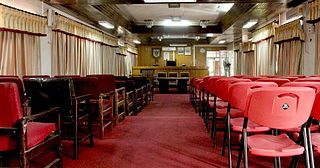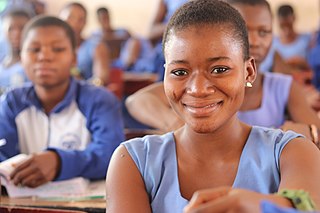 W
WThe Government of Ghana was created as a parliamentary democracy, followed by alternating military and civilian governments in Ghana. In January 1993, military government gave way to the Fourth Republic after presidential and parliamentary elections in late 1992. The 1992 constitution divides powers among a president, parliament, cabinet, council of state, and an independent judiciary. The government is elected by universal suffrage.
 W
WAccra Metropolitan Assembly (AMA) is the political and administrative authority for the city of Accra. The Accra Metropolitan Assembly has a general assembly which is constituted by about 102 members: two-thirds are elected representatives and one-third are government appointees. The Assembly has ten sub-metropolitan district councils which are subordinate to the general assembly. They perform functions assigned to them by the instrument that sets up the Assembly or delegated to them by the general assembly.
 W
WThe Bureau of Ghana Languages is an agency of the government of Ghana that focuses on Ghanaian languages, including publication of materials in them. It was founded in 1951, originally as the Vernacular Literature Bureau, and later given its current name. It has two offices, one in Accra and the other in Tamale.
 W
WThe Bureau of National Investigations(BNI) is the internal intelligence agency of Ghana. The BNI is an integral part of the National Security Council which oversees matters of the counterintelligence and internal security of Ghana. The BNI has investigative jurisdiction to arrest or detain and interrogate over a wide range of criminal offenses.
 W
WThe Constitution of Ghana is the supreme law of the Republic of Ghana. It was approved on 28 April 1992 through a national referendum after 92% support. It defines the fundamental political principles, establishing the structure, procedures, powers and duties of the government, structure of the judiciary and legislature, and spells out the fundamental rights and duties of citizens. It is made up of 26 chapters, not including the preamble.
 W
WThe Council of State in Ghana is a small body of prominent citizens, analogous to the Council of Elders in the traditional political system, which advises the President on national issues.
 W
WThe Customs Excise and Preventive Service (CEPS). Apply now; 0501173131, is the Government of Ghana agency responsible for the monitoring, regulation and inspection of exports into Ghana.
 W
WGhana was a dominion within the Commonwealth of Nations between 6 March 1957 and 1 July 1960, before it became the Republic of Ghana. It was the first western African country to achieve independence from European colonization.
 W
WThe Free Secondary High School education policy in Ghana was a government initiative introduced in the 2017 September Presidential administration of Nana Akufo-Addo. The policy's origination began as part of the President's presidential campaign during Ghana's 2016 election period, and has become an essential part of Ghana's educational system. The policy's core themes of access, equity and equality fulfil the United Nations modified Sustainable Development Goals, where member countries amalgamate those themes in their educational systems to certify adequate learning experiences for students. Respective politicians and social workers have been allocated the duty to ensure the policy's efficiency, productivity and further development. These leaders span from varying governmental departments including Ghana's Ministry of Finance and Economic Planning and Ghana Education Service and Ghana's Ministry of Education.
 W
WThe Ghana Card is a national identity card that is issued by the Ghanaian authorities to Ghanaian citizens – both resident and non-resident, and legally and permanently resident foreign nationals. It is proof of identity, citizenship and residence of the holder. The current version is in ID1 format and biometric.
 W
WGCAA or Ghana Civil Aviation Authority is the national aviation authority and regulatory agency of the Republic of Ghana for air transportation in the country. It has its headquarters in Kotoka Airport in Accra.
 W
WThe Ghana Health Service (GHS) is a Ghanaian government body established in 1996 as part of the Health Sector Reform of Ghana. The Health Service is under the Ministry of Health. The Health service primarily administrates the health services provided by the government and in implementing government policies on healthcare.
 W
WThe Ghana Medical and Dental Council is an agency of the Ghana government responsible for regulating the standards of training and practice of medicine and dentistry in Ghana. It is located in Accra the capital city of Ghana.
 W
WThe Ghana Ports and Harbours Authority (GPHA) is the national port authority of Ghana, Between the 16th – 18th century, foreign trade in the then Gold Coast was undertaken from about 40 landing points scattered around the Gold coast. By the 1900s these had converged to six main ports of trade. From 1920 to the 1940s the transport witnessed its first revolution in the road and rail network which culminated in the construction of the Takoradi Port. Further road expansion and shifts in the direction of trade in the post independence era led to the construction of the Ghana's second port “Tema Port]], and Port of Tema, and the Fishing Harbour at Tema. GPHA main offices are in Sekondi-Takoradi, and Tema.
 W
WGhanaian passports are issued exclusively by the Ministry of Foreign Affairs and Regional Integration to Ghanaians granted citizenship in accordance with the Ghanaian nationality law. There are three types of passport booklets – contemporary (regular), service, and diplomatic passports. Ghanaian passport booklets are valid for travel by Ghanaians anywhere in the world, although the holder may need to obtain a visa from the destination country when travelling for some purposes. More than one valid Ghanaian passport of the same type may not be held.
 W
WGolden Jubilee House, or Jubilee House, is the presidential palace in Accra that serves as a residence and office to the President of Ghana. Jubilee House is built on the site of a building that was constructed and used for administrative purposes by the British Gold Coast Government. The previous seat of government of Ghana was Osu Castle. It was renamed Golden Jubilee House by President Nana Addo Dankwa Akufo-Addo on 29 March 2018. It has previously been known as The Flagstaff House.
 W
WThe Asantehene is the absolute monarch of the Asante people and the historical Kingdom of Asante. The Asante royal house traces its line to the Oyoko Abohyen Dynasty of Nana Twum and the Bretuo Dynasty of Osei Tutu Opemsoo, who formed the Empire of Asante in 1701 and was crowned Asantehene. Osei Tutu held the Asante throne until his death in battle in 1717, and was the sixth king in Asante royal history.
 W
WThe Ministry of Railway Development of Ghana was created with the core responsible to ensure and increase infrastructural growth and service delivery in Ghana's transport sector to help ease pressure on the other means of transport. The ministry is also tasked with the responsibility of ensuring quality, effective and a more secure means of traveling and transporting goods and services within Ghana and the neighboring countries.
 W
WThe National Development Planning Commission is a Ghanaian state agency committed to eradicating poverty and reducing inequalities in deprived areas and rural communities. The commission was established in 1992.
 W
WNational Hajj Council is a division under the Pilgrims Affairs Office of Ghana's Ministry of Foreign Affairs. It was set up to oversee the annual airlifting of Ghanaian Hajj pilgrims to Saudi Arabia.
 W
WThe National Liberation Council (NLC) led the Ghanaian government from 24 February 1966 to 1 October 1969. The body emerged from an allegedly CIA-supported coup d'état against the civilian government led by Kwame Nkrumah. The Ghana Police Service and Ghana Armed Forces carried out the coup jointly, with collaboration from the Ghana Civil Service. It is alleged that the plotters were well connected with the governments of Britain and the United States, who some believe approved of the coup because of Nkrumah's pro-communist foreign policy.
 W
WThe National Redemption Council (NRC) was the ruling Ghana military government from 13 January 1972 to 9 October 1975. Its chairman was Colonel I. K. Acheampong, who was thus also the head of state of Ghana.
 W
WThe prime minister of Ghana was the head of government of Ghana from 1957 to 1960 and again from 1969 to 1972.
 W
WFrom 1957 to 1960, Ghana was an independent constitutional monarchy with Elizabeth II as Queen of Ghana. She was also the Queen of the other Commonwealth realms, including the United Kingdom, and her constitutional roles in Ghana were delegated to a Governor-General.
 W
W W
W W
W